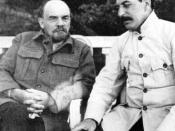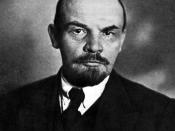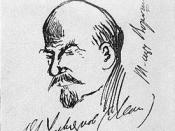Vladimir Lenin led the 1917 Bolshevik Revolution. This revolution overthrew the Russian monarchy and brought to power a government that was the leader of the communist world for the next 75 years. As the first leader of the Soviet Union, he modified the Marxist theory and promoted the communist ideas of Marxism-Leninism.
Lenin was born Vladimir Il'ich Ulianov on April 22, 1870 to an Orthodox Christian family in Simbirsk. He had a simple childhood that was broken throughout his teenage years. Lenin's father died of a stroke when he was 16 years old. Just a year later his brother, Alexander, was arrested for being involved in a plot to assassinate the tsar; Lenin graduated from high school a year later. Strangely enough, he later described his childhood fondly: "We lived in easy circumstances. We did not know hunger or cold, and we were surrounded by all sorts of cultural opportunities and stimuli, books, music, and diversions" (Gort, 51).
Vladimir Lenin normally had a positive outlook on life and was always trying to excel. He entered law school at Kazan University and even received a degree at St. Petersburg University, all the while working in leftist organizations. He had a brief career as a lawyer, but was imprisoned for his political activities in 1895 and later was exiled to Siberia. After his release from Siberia in 1900, he elected to live in exile in Switzerland. There he continued the work on Marxist theory that he had begun in prison and became the leader of the Bolshevik faction of the Russian Social Democratic Labor Party. He returned to Russia during the 1905 revolution, which was put down by the czar, and he went back into exile in 1907. Over the next few years, his influences increased and he worked on a...


